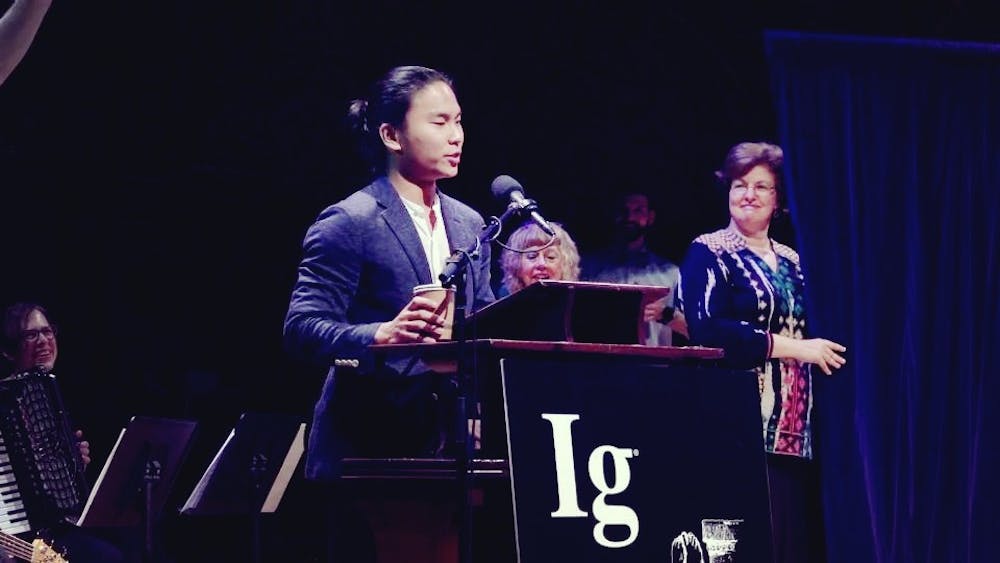Jiwon Jesse Han, a second-year College student, recently won a 2017 Ig Nobel Prize for his paper on coffee spilling entitled: “A Study on the Coffee Spilling Phenomena in the Low Impulse Regime.”
The Ig Nobel Prize is organized by the magazine Annals of Improbable Research and is co-sponsored by Harvard University. Each year, the prize honors 10 achievements that make people laugh, then think. An annual Ig Nobel ceremony is held in Harvard’s Sanders Theatre.
Marc Abrahams, founder of the Ig Nobel Prize Ceremony, said the purpose of the prize is to appreciate the funny, the eccentric and even the absurd research projects that spur people’s interest in science, technology and medicine.
“Each year, we have people searching on scientific literatures. Somebody can also send nominations,” Abrahams said. “These can come from the general public, scientist, journalist and institution. In general, when we select a winner, we get in touch with them quietly. We give them the opportunity to decline the prize. But luckily, almost everybody said yes.”
Han was a senior student at Korean Minjok Leadership Academy in South Korea when he began the research project. In his work, Han explores why people tend to spill coffee as they walk and investigates the physical interaction between the coffee cup and the liquid.
Han started the research project while participating in the International Young Physicists’ Tournament. The coffee-spilling issue was one of the research problems he encountered in the competition. After the competition, however, Han was left largely unsatisfied with the research result.
“I felt like I could do a lot more with the issue of coffee spilling. After graduating from high school and before coming to U.Va., I furthered my research a lot more. I submitted my paper to a journal funded by the Far Eastern Federal University in Russia. That’s when it got published, ” Han said. “Towards the end of last semester, I got a call from the Ig Nobel Prize saying I won the prize.”
Han explained that the walking motion of humans has a certain frequency.
“If that frequency coincides with the natural frequency of the coffee, a physical phenomenon called resonance occurs,” Han said. “In order to not spill coffee or to spill less, one would need to displace the system from resonance by either changing the resonance property of the cup or the liquid.”
“The most expected method is to hold the cup from the top,” Han added. “I referred to it as the hand-claw posture. By holding the cup this way, you have the top joint but also the fingers that move around. So you are adding another joint motion, which changes the oscillation of the cup a lot and displaces the cup from resonance.”
Han also said walking backwards is another way to stop coffee from spilling.
“We are accustomed to walk in front, not to the back,” Han said. “What happens is that when you walk backwards, your step becomes irregular, which means that you no longer have a periodic motion. This also displaces the cup from resonance.”
The usefulness of Han’s research project is not limited to the physics field. In fact, the research result has practical applications in many industries. One example is with large-scale oil tankers.
“When ships carry oil across the sea, the sea also oscillates just as our walking motion does,” Han said. “Unfortunately, sometimes that frequency also causes the ship to resonate. The liquid inside the oil also resonates. We spill coffee, but when the ship spills oil, it’s a completely different story. However, now we realize that we can dissect the oil container into small compartments, which displace the system from resonance.”
The research project is a practice for Han to interpret the world in a concrete, quantitative and mathematical way. He said it allows him to take the time to understand a casual, normal and natural phenomenon.
“You see somebody spill coffee, you can write a poem about it,” Han said. “But can you really explain why he spills coffee? Not many people have attempted to do so. The fact that we can use quantitative math to create a tangible result is something worthwhile.”
Han said the research project positively influences his current academic work at the University and that he finds physics less intimidating because of it.
“I am now more open to plunge myself into the physics field in an aggressive yet good way,” Han said. “Part of the reason why I wrote the paper independently was to show myself that I could do it. A high school kid can do research. It’s about the research topic, not about how old you are.”







